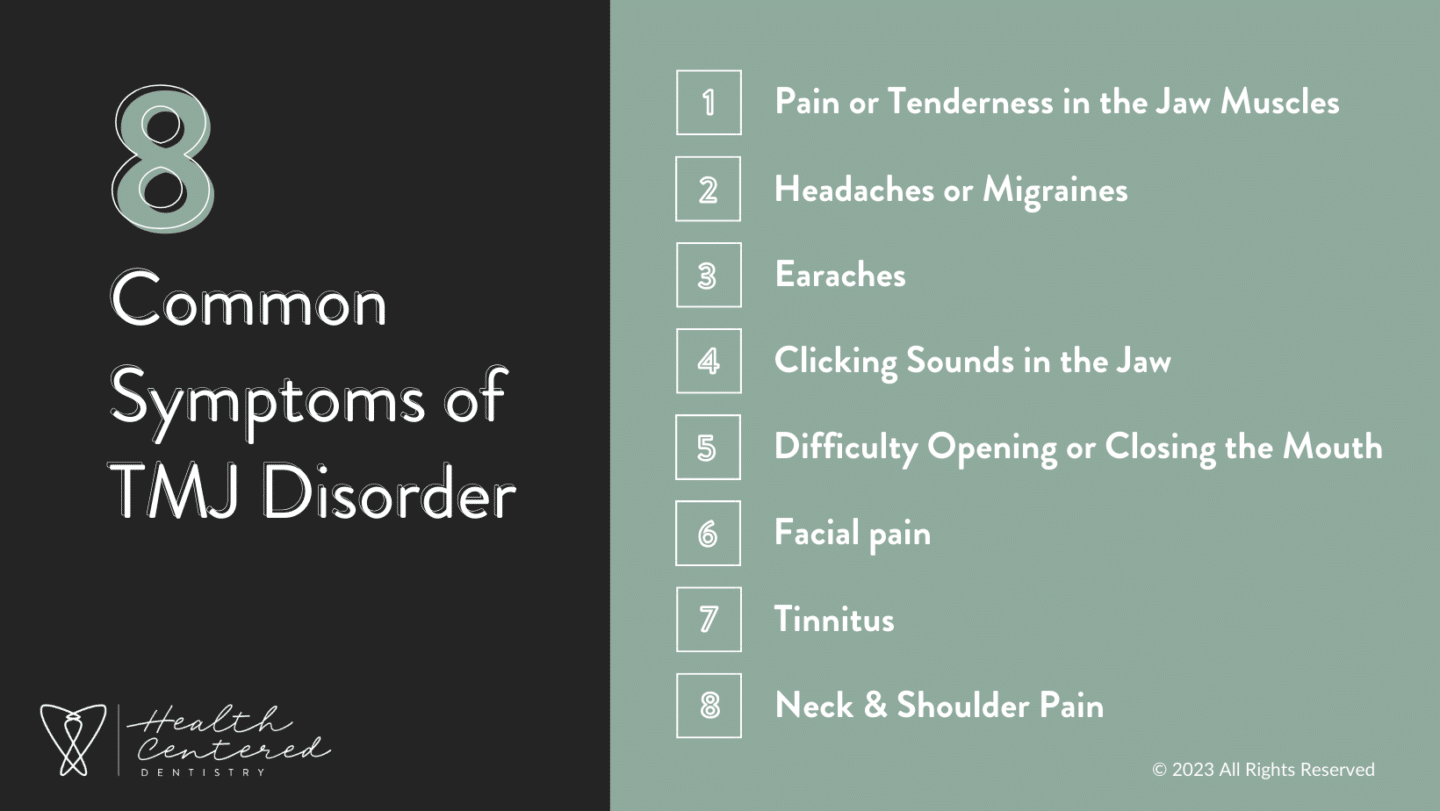Are you living with the discomfort of temporomandibular joint (TMJ) disorder? If so, you’re not alone. TMJ issues can manifest as jaw pain, headaches, and even affect your overall well-being. The good news is that there are holistic dental solutions available at Health Centered Dentistry to help you find relief and lasting comfort.
At HCD, our team of experienced and compassionate professionals is dedicated to addressing the root causes of your TMJ disorder — offering a holistic approach that considers not only your oral health but also your overall well-being.
TMJ issues can impact your daily life — from your ability to enjoy your favorite foods to your overall quality of life. With our personalized treatments, we aim to restore harmony and balance, allowing you to experience a life free from the burdens of TMJ discomfort. At Health Centered Dentistry, we’re here to help you regain control of your health and well-being, one smile at a time.
Learn more about TMJ treatment in Anchorage. Contact Health Centered Dentistry today to get the best Alaskan dental care!
Understanding TMJ: The Basics

Before we uncover our holistic dental solutions, let’s first understand what TMJ is. The temporomandibular joint is a complex hinge connecting your jaw to your skull. When it functions properly, it enables you to speak, chew, and yawn without discomfort. However, if the joint is misaligned or damaged, it can lead to a range of issues, collectively known as TMJ disorder.
Common symptoms of TMJ disorder include:
- Pain or tenderness in the jaw muscles
- Headaches or migraines
- Earaches
- Clicking sounds in the jaw
- Difficulty opening or closing your mouth
- Facial pain
- Tinnitus (ringing in the ears)
- Neck and shoulder pain
How Long Does TMJ Last?
The duration of temporomandibular joint (TMJ) disorder can vary widely from person to person. TMJ is not typically a self-limiting condition — meaning it doesn’t just go away on its own. The duration and persistence of TMJ symptoms depend on several factors, including the cause, severity, and how effectively it is managed and treated.
Here are some general guidelines:
- Acute vs. Chronic: Some individuals may experience acute TMJ symptoms that last for a short period, such as a few weeks to a couple of months. These cases may be related to factors like stress or muscle tension and can improve with self-care and stress management.
- Chronic TMJ: For others, TMJ symptoms can persist over the long term, becoming a chronic condition. Chronic TMJ may last for several months or even years. The severity and frequency of symptoms can vary over time, and they may worsen without appropriate management.
- Underlying Causes: The underlying causes of TMJ disorder can influence its duration. For example, if TMJ is related to teeth grinding (bruxism), it may persist until the bruxism is effectively treated. In cases where structural issues or joint problems are involved, the condition may be more persistent.
- Treatment: The effectiveness of treatment plays a crucial role in the duration of TMJ symptoms. Non-invasive treatments like physical therapy, lifestyle modifications, and stress management techniques can help alleviate symptoms and reduce the duration of discomfort. More invasive treatments, such as surgery, may be required for severe cases.
- Individual Variability: Each person’s experience with TMJ is unique. Some individuals may find relief relatively quickly with appropriate interventions, while others may struggle with the condition for an extended period.
What Happens if TMJ is Left Untreated?
Temporomandibular joint (TMJ) disorders can lead to a range of problems if left untreated. These issues can vary in severity and may significantly impact a person’s quality of life. Here are some common problems associated with TMJ when not treated:
- Chronic Pain: TMJ disorders often cause persistent pain in the jaw, face, neck, and shoulders. This pain can become chronic, leading to discomfort and decreased quality of life.
- Limited Jaw Movement: As the condition progresses, the range of motion in the jaw may become restricted, making it difficult to open or close the mouth fully. This can affect speech and the ability to eat certain foods.
- Headaches and Migraines: TMJ problems can trigger recurring headaches and even migraines. These headaches can be debilitating and negatively impact daily activities.
- Ear and Hearing Problems: TMJ disorders can cause symptoms such as ear pain, tinnitus (ringing in the ears), and even hearing loss in some cases.
- Facial Discomfort: Patients with untreated TMJ issues may experience facial discomfort, which can include aching, tenderness, or even swelling in the face.
- Sleep Disturbances: TMJ disorders can lead to sleep problems, including sleep apnea and snoring. Sleep disruptions can further exacerbate other health issues.
- Dental Problems: Untreated TMJ disorders can lead to dental issues, such as bruxism (teeth grinding and clenching), which may result in tooth wear, chipping, or damage.
- Psychological Impact: Chronic pain and discomfort can lead to emotional and psychological distress, including anxiety and depression. It may also affect a person’s self-esteem and overall well-being.
- Reduced Quality of Life: The cumulative impact of these problems can significantly reduce a person’s quality of life, making it challenging to perform everyday tasks and enjoy social activities.
- Complications with Eating: Difficulty in chewing and swallowing may arise as TMJ symptoms worsen, potentially leading to nutritional deficiencies.
- Complicating Factors: In severe cases, untreated TMJ disorders may lead to complications like joint degeneration, structural damage, and the need for more invasive and costly treatments, including surgery.
It’s essential to seek treatment for TMJ disorders early on to prevent these problems from becoming chronic and to improve your overall well-being. A healthcare professional or a dentist with experience in TMJ diagnosis and treatment can help you manage and alleviate the symptoms of this condition.
Our Holistic Approach to TMJ Treatment
At Health Centered Dentistry, we take a comprehensive and patient-centered approach to TMJ treatment methods. Our commitment to holistic dentistry means we consider the entire body when diagnosing and treating TMJ disorders — unlike other treatment methods.
Here are some key elements of our holistic approach:
1. Comprehensive Assessment: Our experienced dental team conducts a thorough assessment of your condition, considering both dental and medical factors that could be contributing to your TMJ issues.
2. Individualized Treatment: We understand that each patient is unique. Your treatment plan will be tailored to your specific needs, addressing the underlying causes of your TMJ disorder.
3. Non-Invasive Therapies: Whenever possible, we prioritize non-invasive therapies to alleviate TMJ symptoms. This may include techniques like physical therapy, relaxation exercises, and dietary recommendations.
4. Biocompatible Materials: We practice biological dentistry, which takes into account the potential impact of dental materials and procedures on your overall health. We use biocompatible materials and techniques to minimize any adverse effects.
5. Collaborative Care: In complex cases, we may collaborate with other healthcare professionals, such as physical therapists or chiropractors, to provide you with a well-rounded approach to TMJ treatment.
6. Long-Term Solutions: Our holistic approach isn’t just about symptom management. We aim to provide you with long-term solutions that address the root causes of your TMJ disorder, offering lasting relief and improved quality of life.
Take the First Step Toward TMJ Relief with Health-Centered Dentistry
If you’re suffering from TMJ disorder in Anchorage, don’t let the pain and discomfort hold you back from living your life to the fullest. Health Centered Dentistry is here to provide you with holistic dental solutions that can help you find lasting relief and overall well-being.
Treatment options at HCD:
- TMJ Mouth Guard: Wearing a mouth guard at night and during the day as needed can help relieve pain and the pressure that you place on your jaw from teeth grinding or clenching. We can fabricate an occlusal guard to help reduce daily pain caused by a TMJ disorder.
- TMJ Physical Therapy: Sometimes physical therapy is necessary to restore your jaw’s function and reduce pain. We partner with various physical therapy offices in Alaska to help you receive the care you need, including Alaska Physical Therapy Specialists and Advanced Physical Therapy of Alaska.
We invite you to schedule a consultation with our knowledgeable team to explore your personalized TMJ treatment plan. It’s time to take the first step on your journey to a pain-free, holistic smile.
Learn more about holistic TMJ treatment in Anchorage, AK. Contact Health Centered Dentistry today to get the best Alaskan dental care!


